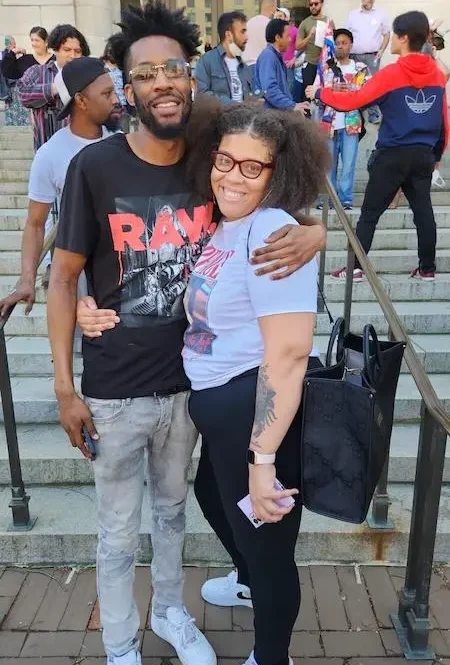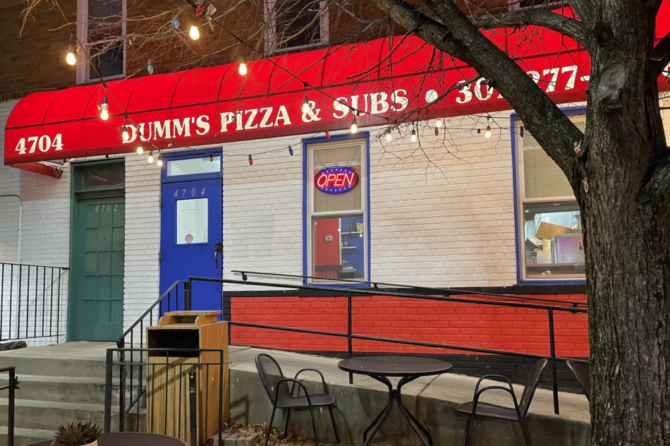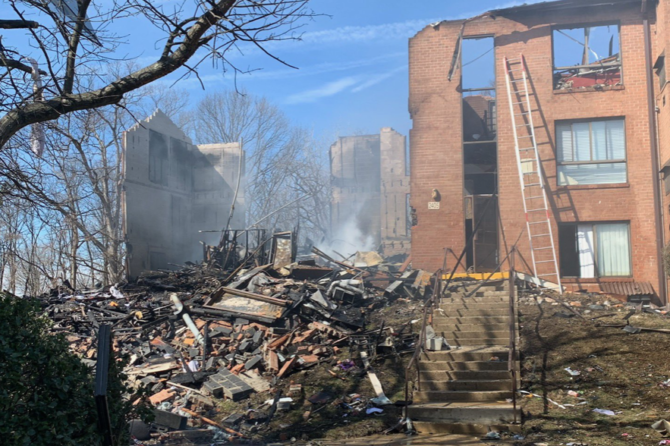WASHINGTON INFORMER: Local street vendors celebrated a victory last week with the passage of the Street Vendor Advancement Amendment Act, which decriminalizes street vending, sets up vending zones and spaces and streamlines a licensing process that had been criticized as expensive and complicated.
This milestone had been a major relief for many vendors, including Northwest resident and returning citizen Chuck Bradley who recounted often struggling to avoid police officers who’d shut down his operations and confiscate his wares.
For more than 20 years, Bradley has posted up along 14th Street in Columbia Heights to sell artwork, clothes, shoes, coats, jackets and even jewelry made by his wife. He said he saw his uncle similarly set up shop during the 1980s. He later walked in his footsteps as a viable means of making income.
However, run-ins with the police throughout the 1990s and 2000s often became too expensive than what Bradley could bear at times. “Sometimes, I’d have to put money to the side… in case [the police] took my stuff,” Bradley told the Informer.
Bradley, who recently applied for his license, begrudgingly said he’s scheduled to conduct a background check. With the legislation soon to be in place, he expressed excitement about what’s to come for native Washingtonians and returning citizens like himself who are trying to make a way.
“The police started bothering me before the shopping center [was constructed] when the building across from the Target was a playground and post office,” Bradley said. “They didn’t want ex-cons getting licenses. Now, I’m trying to get my mentoring [organizations] together to help youth and show them people in the community doing positive things.”
The Last Stretch to Passage in the Council
Street Vendor Advancement Amendment Act removes criminal penalties for street vending and allows the mayor to establish sidewalk vending zones. The legislation also waives licensing-related civil citations for vendors who obtain an individual sidewalk vending license or register with a sidewalk vending zone manager.
The bill also reduces licensure costs and abolishes criminal background check requirements for vendors applying for their license
On April 4, the D.C. Council unanimously passed the Street Vendor Advancement Amendment Act after Council Chairman Phil Mendelson (D) and Council members Brianne Nadeau (D-Ward 1) and Christina Henderson (I-At large) crafted an “amendment in the nature of a substitute” that created a new licensing category for street vendors selling food they prepared at home.
During a March 7 legislative meeting, Henderson, chairperson of the D.C. Council Committee on Health, deviated from her colleagues and voted “present” during the first reading of the Street Vendor Advancement Amendment Act due to concerns about what, at the time, had been provisions in the legislation expanding street vendors’ ability to sell food not approved by DC Health.
The amendment in the nature of the substitute, approved by all 13 D.C. council members, requires street vendors selling homemade food to obtain a microenterprise home kitchen business permit. To do so, they would register with DC Health, submit documentation detailing how food will be stored, handled and prepared, and allow DC Health to conduct inspections before the business begins operation.
Another provision in the nature of a substitute clarifies that police officers may only request that street vendors provide identification if they refuse to divulge their legal name and current address, or that the officer has reason to believe that the vendor is providing wrong information. The term “detain” had also been changed within the legislation to mean “stop and order a person to remain at their current location or nearby location specified by an enforcement officer.”
Finally, the amendment in the nature of a substitute authorizes the D.C. chief financial officer to provide amnesty to street vendors with delinquent minimum sales tax payments.
The Street Vendor Advancement Amendment Act now goes to D.C. Mayor Muriel Bowser’s desk to be signed before entering the congressional review process. Even with the question of how, or whether, the legislation will be funded in the fiscal year 2024 budget, it will be effective immediately. ‘
For the time being, Nadeau, along with grassroots organizers affiliated with the Beloved Community Incubator, continue building upon recent successes. During the latter part of March, street vendors flocked to the D.C. Department of Parks and Recreation’s first public meeting about the design of the triangle park near 14th Street and Oak Street in Northwest that will serve as a new vending zone.
“From the start, we have wanted everyone in compliance and accountable, everyone safe, and everyone successful. Thanks to Council member Henderson and Chairman Mendelson, this bill is better – I hope we can continue working together on the next steps of funding and implementation,” Nadeau said. “If a business owner with a storefront has an expired license, police don’t come and arrest them. The same should be true when a street vendor is out of compliance.
A Veteran Street Vendor Anticipates Having Some Order
A veteran street vendor who asked to be identified as Mama Queeny extolled the efforts of her fellow businesspeople to secure the passage of the Street Vendor Advancement Amendment Act. She told the Informer that, with new systems in place, she looked forward to seeing more organization and cordiality among street vendors.
Mama Queeny, a lifelong entrepreneur, had been vending in the District since immigrating from the Caribbean in the late 1980s. First she sold incense, and later parlayed her success into the sale of other high-quality materials including jewelry, oils, sunglasses, bed sheets, and clothes.
As Mama Queeny recalled, her prominence along 14th Street has gotten her noticed not only locally, but in other cities where, while vending at festivals, she would encounter old customers who spoke highly about her demeanor.
Before setting up shop along 14th Street in Northwest 15 years ago, patrons could find Mama Queeny near 18th Street and Columbia Road in Northwest, oftentimes with her children playing under the table. In her early days as a Columbia Heights street vendor, Mama Queeny and others slept overnight at their spot to make sure they had a suitable portion of 14th Street to conduct business.
Though she always had her license to sell her wares in those areas, Mama Queeny acknowledged that additional fees could create hardship for those working to build their street vending venture. That’s why she said she looks forward to what the legislation could do for up-and-coming vendors.
“The licensing fee will cost less and everyone would like a reduction [in the price]. For those who pay late and get a penalty, [the legislation] is a beautiful thing,” Mama Queeny said.
“The market is so wide [so] you have to find your own [type of product] and use your ability,” she added. “It causes problems when you’re in a festival and people are fighting for you to vend but they don’t put things in order. People don’t need to be in the same spot. People have to stop being greedy.”










